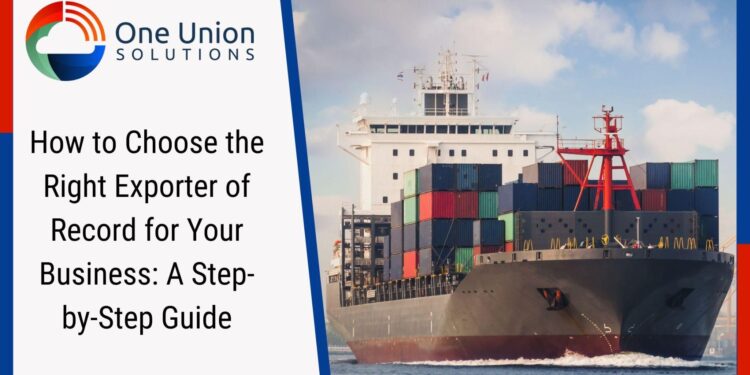Businesses of all sizes are expanding across borders, finding new markets, and exploring international trade opportunities in today’s global economy. An important part of international trade is finding the right Exporter of Record (EOR) for your business. Selecting the right EOR can make a big difference in the success and efficiency of your international trade.
Here’s a step-by-step guide to choosing the right Exporter of Record for your business.
1. Analyze your business needs
It’s essential to assess your business needs and goals before choosing an Exporter of Record. Take into account the type of products you sell, the countries you plan to operate in, the volume of trade, and any special regulations. Determine what expertise and capabilities you want from an EOR by understanding your business requirements.
2. Find out who the record exporters are
The next step is researching potential Exporters of Record based on your business needs. You should start by doing a thorough online search and compiling a list of reputable EOR companies. Find a provider with experience in your target countries, a proven track record, and an understanding of the relevant regulations and compliance rules.
3. Check out their experience and expertise
The most important thing to look for when evaluating potential Exporters of Record is their experience and expertise in your industry and target countries. Look for EOR providers with experience supporting businesses like yours. Ensure they understand the specific challenges and regulations associated with your industry, so that they can tailor solutions to meet your needs.
4. Take compliance and regulatory knowledge into account
The international trade industry is regulated, including customs compliance, export controls, and trade sanctions. Make sure your Exporter of Record has extensive regulatory and compliance knowledge to avoid penalties, delays, and lawsuits. Make sure the EOR you choose understands international trade regulations and has a strong compliance program.
5. Analyze technology and IT capabilities
The digital age has changed the way international trade operates. Find out what technology and IT capabilities potential Exporters of Record have. Look for providers that use advanced systems and software to improve data accuracy, streamline trade processes, and enhance visibility. Your supply chain can be optimized, administrative burdens can be reduced, and overall efficiency can be improved with EOR.
6. Take scalability and flexibility into account
Your business will grow and expand internationally, so it’s important to choose an Exporter of Record that can scale and adapt. Assess the scalability and flexibility of potential providers to make sure they can handle your future needs. Changing trade volumes, new markets, and changing regulatory landscapes won’t affect your operations with a flexible EOR.
7. Analyze Service Level Agreements (SLAs)
In a Service Level Agreement (SLA), your business and the Exporter of Record agree on terms, conditions, and performance expectations. Ensure your business requirements align with the SLAs offered by potential providers. Keep an eye on the key performance indicators (KPIs), response times, dispute resolution process, and any added services or benefits.
8. Ask for recommendations and references
Seek recommendations and references from trusted sources when choosing an Exporter of Record. Contact other companies in your industry or those with experience in international trade. You might be able to get some reviews and recommendations from them about EOR providers they’ve used. Real-life experiences can give you valuable insight and help you make an informed decision.
9. Take a look at the insurance and risk management
There are risks associated with international trade, like customs compliance issues, product damage, or shipping delays. Check if the Exporter of Record has insurance coverage to mitigate these risks. Having adequate insurance shows you’re serious about protecting your business interests and gives you some peace of mind.
10. Take cultural and language expertise into account
Being able to operate in foreign markets requires understanding different cultures, customs, and languages. You might want to consider Exporters of Record who have language and cultural expertise in your target countries. Interacting with local authorities, suppliers, and customers will be easier, reducing the chances of miscommunication.
This step-by-step guide will help you pick the right Exporter of Record for your business. Each business is different, so finding the perfect EOR means taking your specific circumstances into account. You can set a strong foundation for successful international trade by prioritizing expertise, compliance, technology, and scalability.








